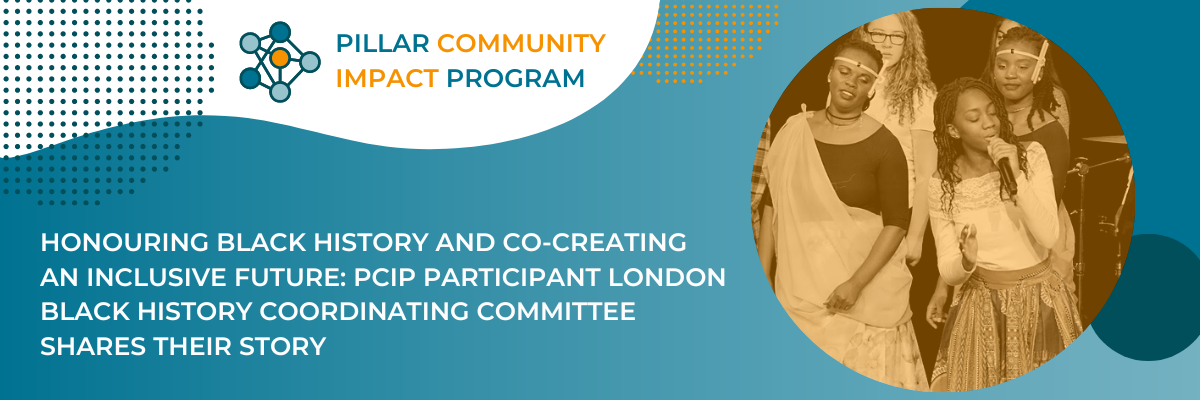
When the London Black History Coordinating Committee (LBHCC) was formed in 2002, the group had the goal to increase engagement in local Black History Month activities. The committee’s aim was to “engage the community in celebrating Black History Month through organizing, supporting, and collaborating with community organizations on programs and activities that are available in the region to educate, inform and uplift.”
While the committee has successfully run engaging and inspiring Black History Month programming for over 20 years, the volunteer-led group has long worked year-round contributing to strategic projects with various community partners. These projects span from education about the roles that the Black communities have played locally across the decades, to advocacy and strategic discussions with major community organizations on equity and inclusion.
“As a community, we still have a lot of work to do so that people understand that our community has been part of London's community for a very long time. It’s always a struggle to think that people don't know that,” said the organization’s Chair, Carl Cadogan. “Even the people that are from the Black community don't understand some of their role in the community. So, it's not just the broader community, but it's also trying to help to educate some of the young Black kids about the history of the community.”
The organization has been in the news this year for their efforts to help with the relocation of the Fugitive Slave Chapel to Fanshawe Pioneer Village. LBHCC worked with Fanshawe Pioneer Village and alongside other local Black community organizations, including Black Lives Matter, London Black Network, and the Congress of Black Women of Canada, to ensure the project was done in a way that both supports restoration and respects the history of the chapel. The committee was part of the fundraising efforts for the relocation, and was also engaged in the filming of a forthcoming documentary about the chapel.
LBHCC is routinely at the table consulting on important projects for local organizations such as the City of London and the Thames Valley District School Board, representing the interests of local Black communities and advocating for equity and inclusion. In summer 2022, they worked with the city facilitating a roundtable discussion with local Black organizations, and representatives from other communities, on how our streets and buildings should be named going forward.
Similarly, LBHCC worked with the Thames Valley District School Board sitting on a steering committee alongside other community members, educators and school board officials about the renaming of some of their schools. LBHCC helped the group examine why certain schools were named as they were, negative impacts the names may have on equity-seeking communities, whether the schools should be re-named and how to engage communities in the process.
In the year of their twentieth anniversary, the organization has been reflecting on how they can preserve the incredible wealth of records and artifacts relating to local Black communities they have collected. They are currently working on an archival project documenting their history, involvement in community projects, and cataloging the various artifacts relating to local Black history. They hope this project will be publicly accessible for generations to come seeking information about local Black communities and are working out the details of partnership to make that possible.
The combination of their recent anniversary, and the challenges of COVID, has also caused the organization to pause and regroup on what lies ahead. They are now considering important questions like, how to improve efficiencies as a volunteer-led operation, recruiting new volunteers, how to become a fully-fledged nonprofit, and what their name should be going forward.
When LBHCC was informed about the Pillar Community Impact Program, they thought they would be a great fit for strategic planning consulting. Earlier this year, Pillar’s Impact Consulting team supported committee members through strategic planning sessions helping them start the process of planning for the years ahead.
"It was good to have people independent of our organization who can look in and not have ownership in the same way as volunteers, and who could provide critical feedback. It was really good to have at this point in time, a different kind of discussion with someone who can facilitate some of what we've been thinking, and it's helped us a lot.” said Cadogan. “It has pushed people to say - we’ve got to do something. Everyone is at the place where we agree we have to do something differently. We’re in a better place now."
LBHCC is always open to hearing from interested community members who would like to volunteer their time and talents and are currently looking for support in marketing and communications, social media, grant writing and other fundraising activities.
“We want people to be involved, and it is not just folk from the Black community. Our committee right now is a very diverse committee,” said Cadogan. “It's good to have people who can bring different perspectives to some of the things that we're planning. So it's absolutely important to get more people involved. And we particularly need to get more young people involved.”
Visit the London Black History Coordinating Committee’s website to stay up to date with their news and events and learn more about how to support the organization as they look ahead to their next chapter. You can also hear more about LBHCC on a recent episode of Pillar’s podcast and show, Pollinating Purpose.
